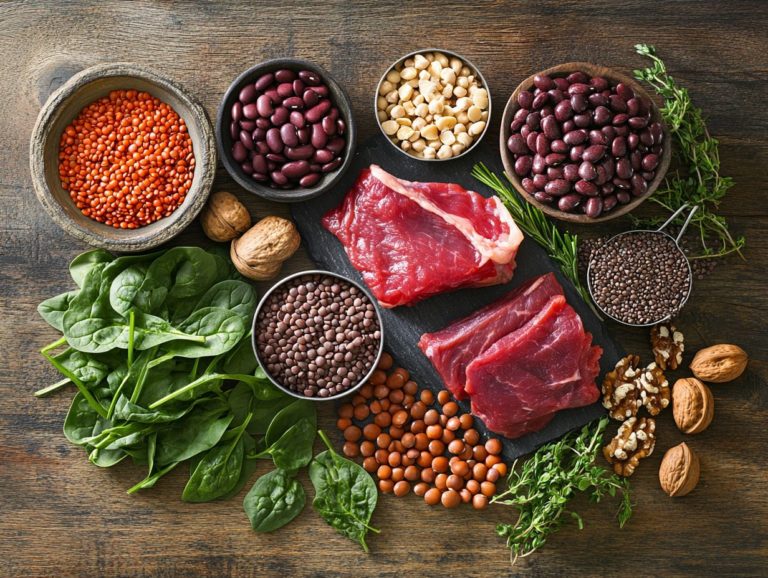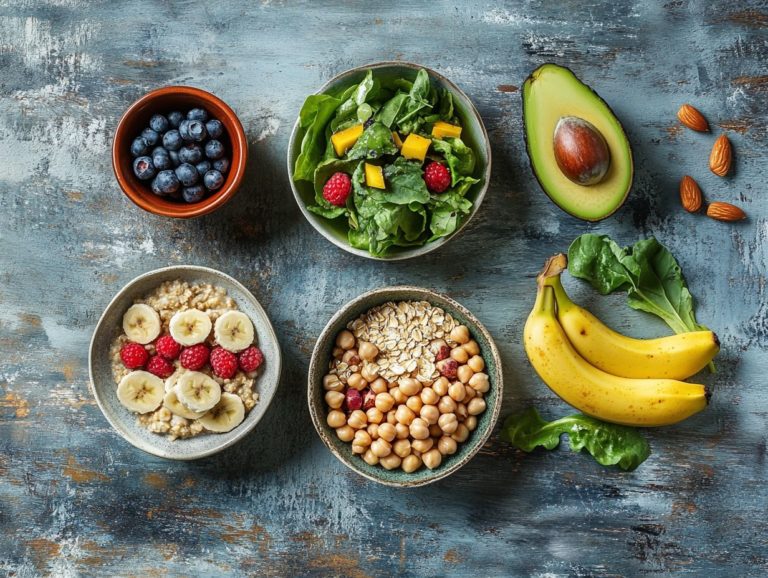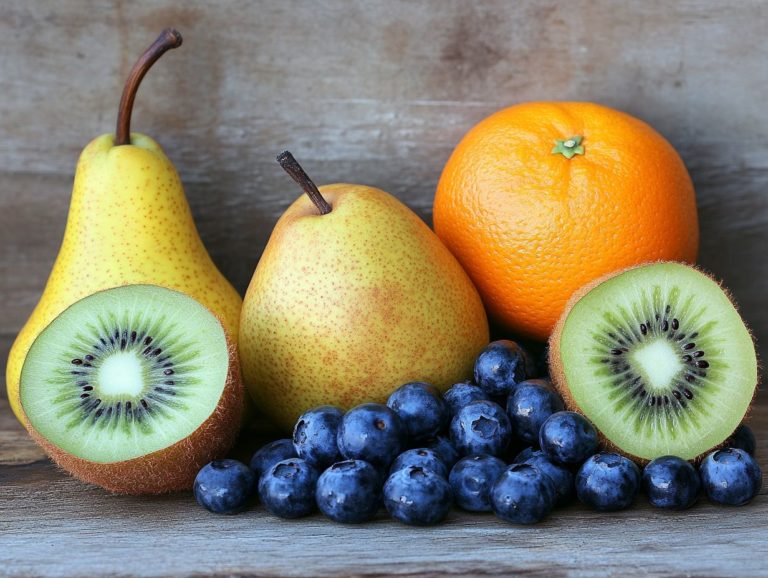The Importance of Whole Grains in Your Diet
Whole grains are more than just a trend. They are the building blocks of a healthy diet packed with vital nutrients.
Get ready to discover the amazing world of whole grains! This article uncovers their remarkable nutritional benefits and their role in disease prevention. You’ll find practical tips for easily incorporating them into your meals and clarity on the differences between whole and refined grains. Plus, we’ll dispel common myths that often surround them.
Prepare to elevate your understanding of whole grains and discover the many ways they can enhance your health!
Contents
- Key Takeaways:
- What are Whole Grains?
- The Benefits of Whole Grains
- How to Incorporate Whole Grains into Your Diet
- Whole Grains vs. Refined Grains
- Common Myths About Whole Grains
- Frequently Asked Questions
- What are whole grains and why are they important in my diet?
- What are the health benefits of consuming whole grains?
- How much whole grains should I consume in a day?
- What are some good sources of whole grains?
- Can whole grains help with weight loss?
- Are there any potential downsides to consuming whole grains?
Key Takeaways:
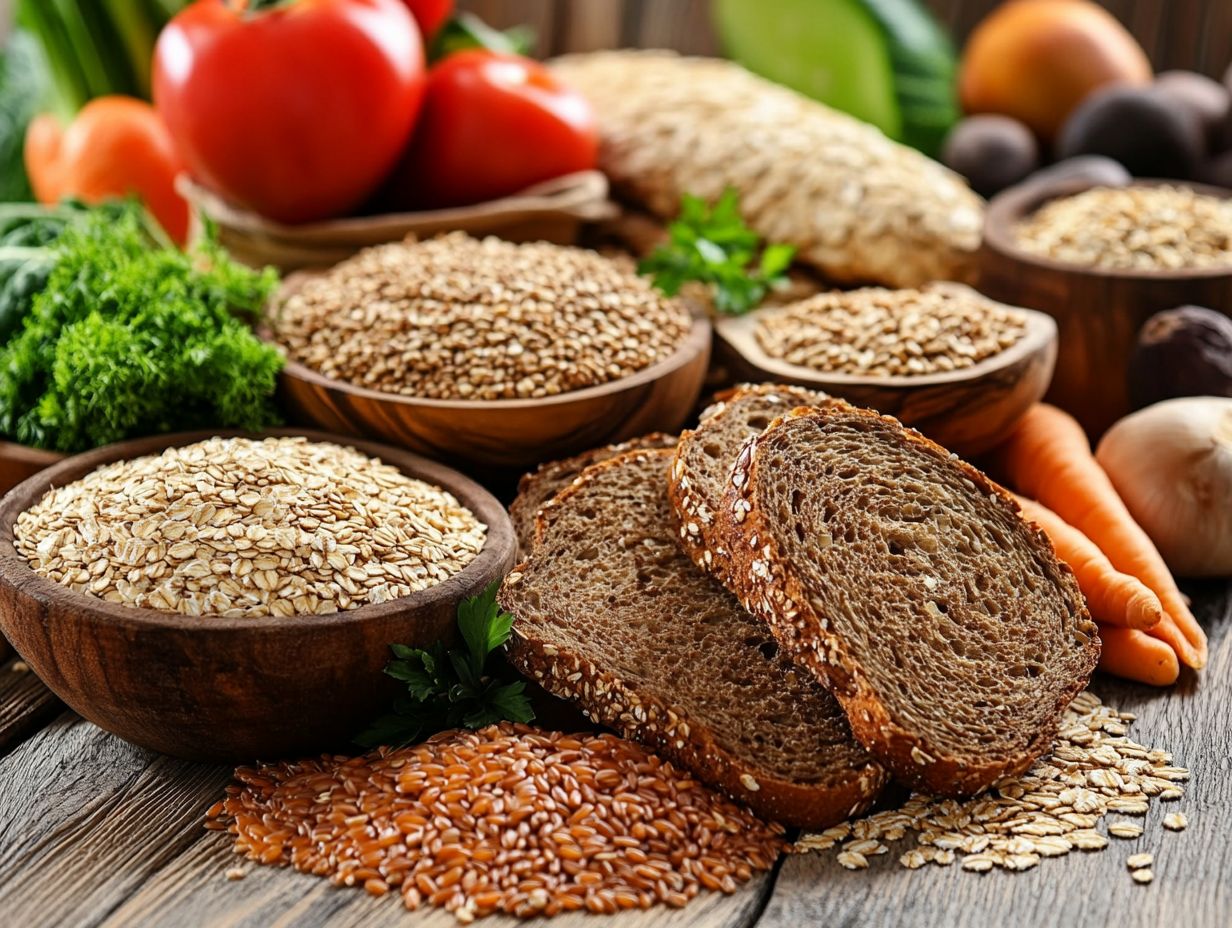
- Whole grains are nutrient-dense foods that provide essential vitamins, minerals, and fiber for a healthy diet.
- Including whole grains in your meals can lower your risk of chronic diseases and improve overall health.
- Swap refined grains for whole grains by choosing options like whole wheat, brown rice, and quinoa and incorporating them into your favorite dishes.
What are Whole Grains?
Whole grains retain all three essential components the bran, germ, and endosperm after processing. This preservation ensures you get a wealth of nutrients vital for maintaining optimal health and warding off chronic diseases.
Rich in dietary fiber and natural compounds found in plants that promote health, whole grains actively support digestive health, heart function, and overall well-being.
In contrast to refined grains, which undergo extensive processing in industrial roller mills, whole grains are a superior choice that aligns with dietary guidelines and offers numerous health benefits.
Definition and Nutritional Value
Whole grains are an essential source of dietary fiber, nutrients that boost health, and natural compounds found in plants that promote health. These components support your bodily functions and improve your well-being.
The high fiber content benefits digestion, helps regulate blood sugar levels, and aids in maintaining a healthy weight by promoting feelings of fullness.
Whole grains also contain essential vitamins, especially B vitamins, important for energy metabolism and brain function. You’ll find important minerals like magnesium and iron in abundance, both crucial for bone health and oxygen transport throughout your body.
The antioxidants in whole grains combat oxidative stress and reduce inflammation, lowering your risk of chronic diseases like heart disease, diabetes, and certain cancers.
Adding whole grains to your meals enriches your diet and supports your overall health.
The Benefits of Whole Grains
Eating whole grains is linked to numerous health benefits, especially a lower risk of chronic conditions like cardiovascular disease, type 2 diabetes, and certain cancers.
Research, including the Iowa Women s Health Study and the Harvard Nurses Health Study, shows that integrating whole grains into your diet can significantly lower inflammation levels and enhance overall wellness.
By prioritizing fiber-rich options, you can boost your dietary fiber intake, further enhancing your health.
Health Benefits and Disease Prevention
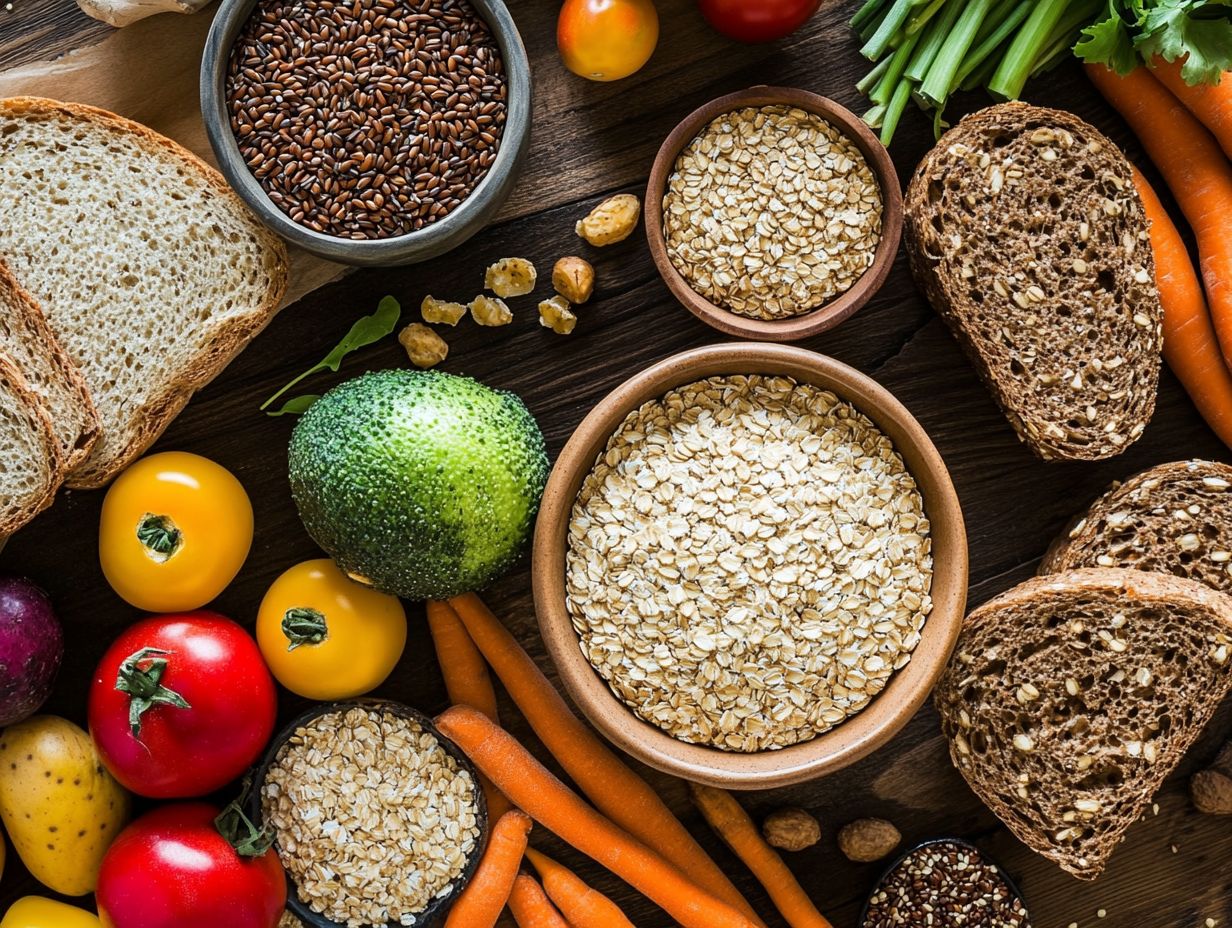
Whole grains are your allies in disease prevention and better well-being, thanks to their impressive fiber content, which links to a lower risk of chronic illnesses like cardiovascular disease and type 2 diabetes.
If you enjoy at least three servings of whole grains each day, research suggests you could reduce your risk of heart disease by up to 22%.
These grains promote gastrointestinal health, as their fiber keeps your digestive system running smoothly and can help tackle issues like constipation. Furthermore, studies indicate that a diet rich in whole grains may lower the risk of certain cancers, particularly colorectal cancer, with evidence showing a 17% reduced risk for those who incorporate sufficient whole grains into their meals.
By making whole grains a staple of your diet, you’re not just nourishing your body; you re also fortifying your defenses against some of the most common health challenges out there.
How to Incorporate Whole Grains into Your Diet
Incorporating whole grains into your diet is easier than you might think. Start by selecting and preparing a variety of whole grain options that fit dietary guidelines.
Choosing foods like brown rice, quinoa, whole wheat bread, and oats enhances the flavor of your meals. These options also ensure a fiber-rich diet that supports healthy blood sugar levels and provides essential health benefits.
If you have gluten sensitivities, try gluten-free whole grains such as buckwheat and millet. They are excellent alternatives that offer the same nutritional benefits without compromising quality.
Easy Ways to Add Whole Grains to Your Diet Now!
To enrich your meals with more whole grains, start planning your meals today to boost your health. Swap out refined ingredients for their whole grain counterparts.
For example, whole grain pasta can transform a simple dish with its nutty flavor while providing more nutrients. Oats are another versatile option they blend seamlessly into smoothies, adding a creamy texture and fiber boost without altering the taste.
When baking, try whole grain flours like spelt or buckwheat to significantly enhance the nutritional value of your favorite treats. Dishes like hearty quinoa salad or whole grain pancakes not only highlight these ingredients but also cater to various dietary preferences, including gluten-free options.
Whole Grains vs. Refined Grains
The key difference between whole grains and refined grains lies in their nutritional quality. Whole grains keep all parts of the grain bran, germ, and endosperm while refined grains undergo processing that removes vital nutrients and fiber.
Choosing whole grains means opting for a more nutrient-rich choice that supports your overall well-being.
Understanding the Difference
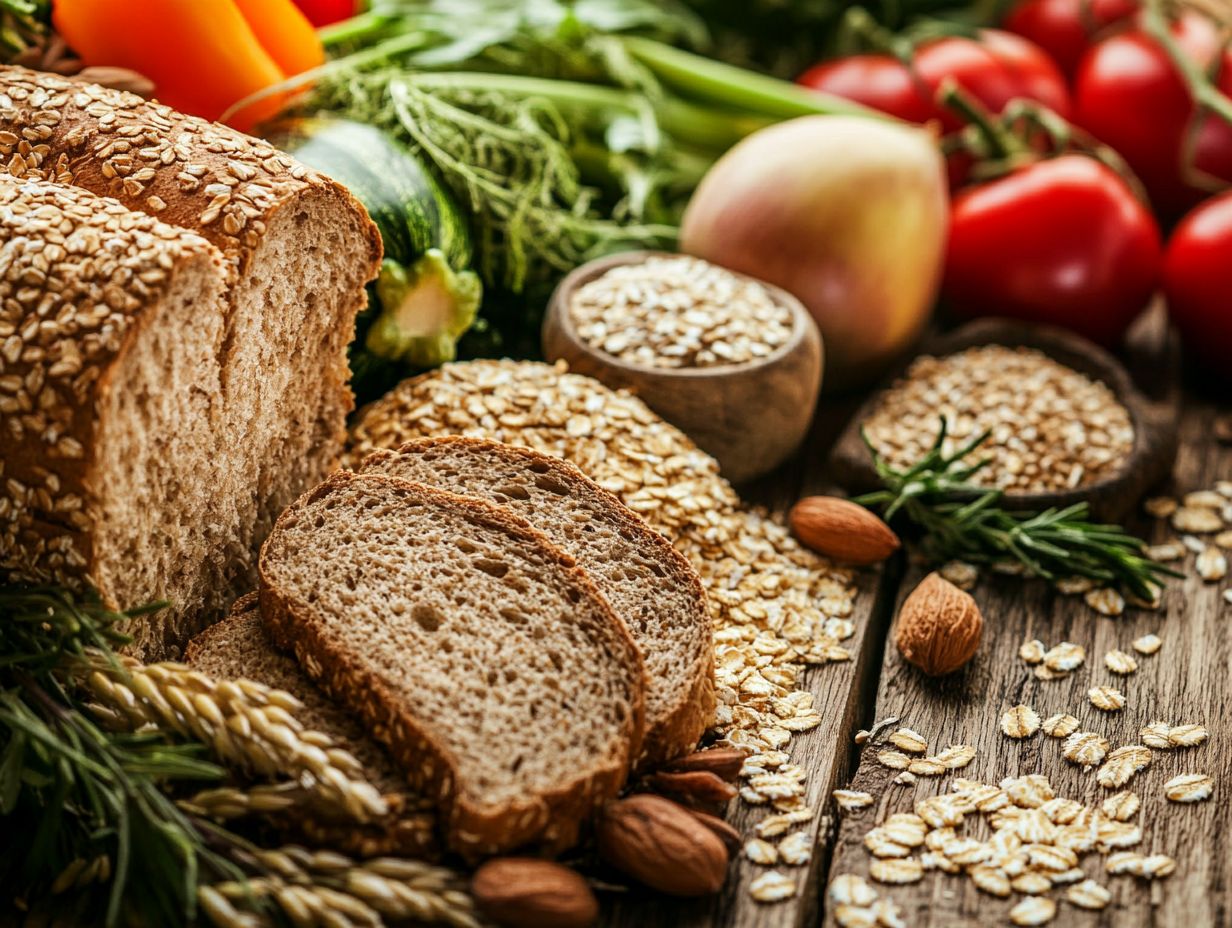
Knowing the difference between refined and whole grains is crucial for making informed dietary choices that support long-term health.
Refined grains undergo significant processing, stripping away the bran and germ the parts rich in essential nutrients like fiber, vitamins, and minerals. This leaves behind a starchy endosperm, resulting in products that often lack the nutritional benefits of whole grains.
In contrast, whole grains maintain their complete structure. This means they provide fiber and valuable natural compounds in plants that offer health benefits. Whole grains aid digestion and help reduce the risk of chronic diseases.
By adding more whole grains to your diet, you can enjoy numerous health benefits, including improved heart health, better digestion, and consistent energy levels throughout the day.
Common Myths About Whole Grains
Despite the many health benefits of whole grains, you may encounter common myths that create confusion and spread misinformation.
For example, some believe that all whole grains contain gluten or that they are unsuitable for effective weight management. Let s clear up these myths about whole grains!
Debunking Misconceptions
Understanding the true value of whole grains in a healthy diet is essential, especially regarding their gluten content and suitability for various dietary needs.
Many people mistakenly think that all grains are harmful, associating them solely with gluten-related issues. This view overlooks a variety of whole grains that are naturally gluten-free, such as quinoa, brown rice, and millet.
Numerous studies by nutrition experts show that whole grains are packed with essential nutrients like fiber, vitamins, and minerals. These components are vital for promoting digestive health, aiding weight management, and preventing chronic diseases.
Research from the Harvard T.H. Chan School of Public Health indicates that incorporating whole grains into your meals can lower the risk of heart disease and type 2 diabetes. This evidence clearly shows that embracing these foods is a fundamental part of a balanced diet, not something to be feared.
Frequently Asked Questions
Have more questions? Don t hesitate to reach out or explore our resources!
What are whole grains and why are they important in my diet?
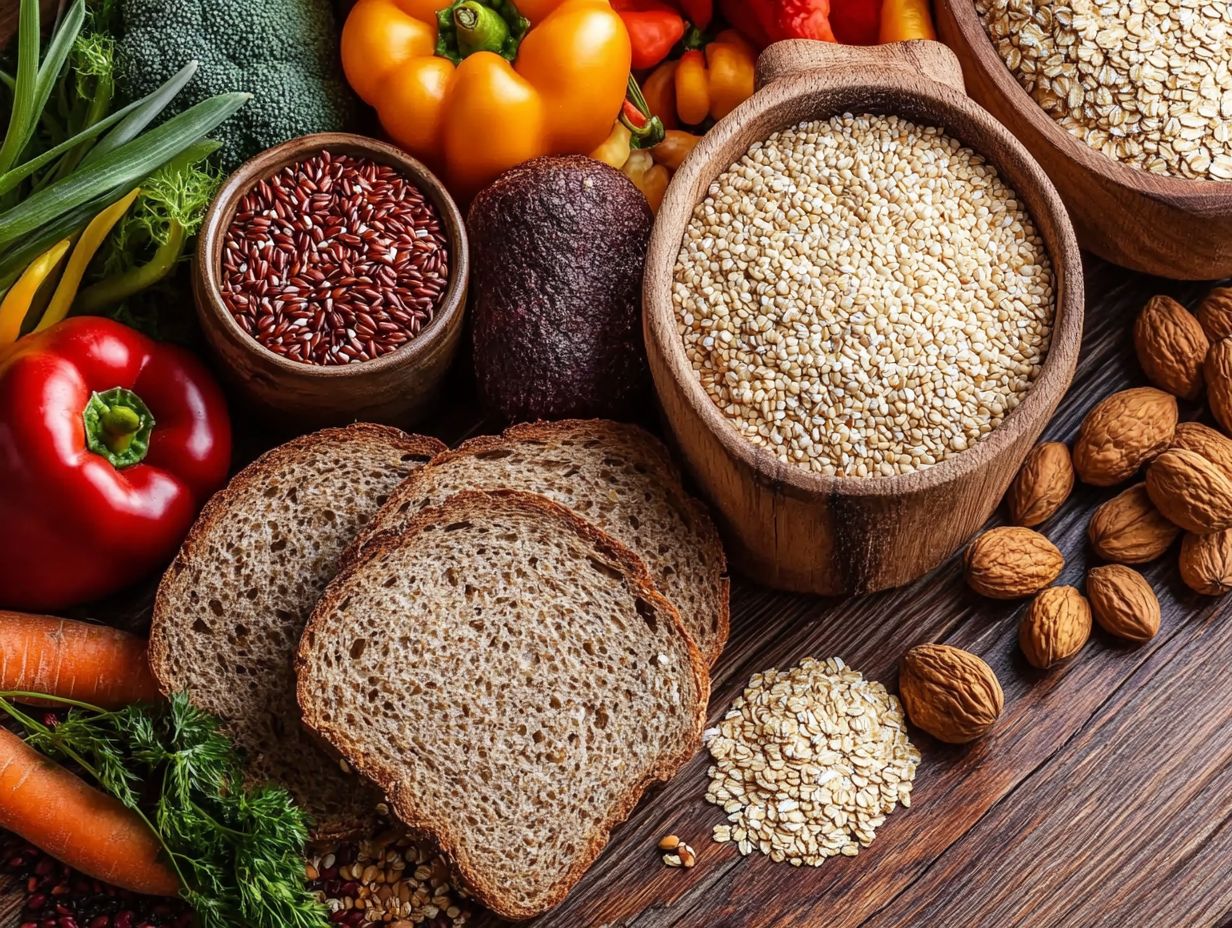
Whole grains are grains that contain the entire seed, including the bran, germ, and endosperm. They are important because they provide nutrients, fiber, and antioxidants substances that help protect your cells.
What are the health benefits of consuming whole grains?
Consuming whole grains reduces the risk of chronic diseases like heart disease and type 2 diabetes. They also promote healthy digestion and help with weight management.
How much whole grains should I consume in a day?
The recommended daily intake is at least 3 servings, about 48 grams. This includes foods like whole grain bread, pasta, brown rice, and oatmeal.
What are some good sources of whole grains?
Great sources of whole grains are quinoa, brown rice, oats, whole wheat pasta, and whole grain bread. Always check food labels for products listing whole grains as the first ingredient!
Can whole grains help with weight loss?
Yes! Whole grains can aid in weight loss because they are high in fiber and protein, keeping you full longer. They also have a lower glycemic index, which prevents blood sugar spikes.
Are there any potential downsides to consuming whole grains?
While whole grains are generally healthy, some may have sensitivities to certain grains, like gluten. Listen to your body and consult a healthcare professional if you notice negative reactions.

